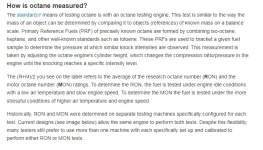- Joined
- Jul 7, 2017
- Messages
- 15,469
- Reaction score
- 9,604
- Points
- 113
- Location
- Parrish, FL
- Genesis Model Year
- 2018
- Genesis Model Type
- Genesis G80
Are you aware of how gas is refined and shipped? Difference between brands? OK. the difference is in the advertising, not the product.You'd get better gas mileage with higher octane fuel. Premium from a good station like Shell also has cleaners that'll keep carbon from building up on your injectors and intake valves.
All gasoline is refined to the same specifications for either regular or premium grade and goes into a pipeline or tanker to take it to a port tank farm. The delivery truck takes on the proper octane and if it is a Top Tier they add the additives in the tanker to be mixed. Then he makes a delivery and the same exact product may go to Shell, Marathon, or any of the stations using Top Tier.










